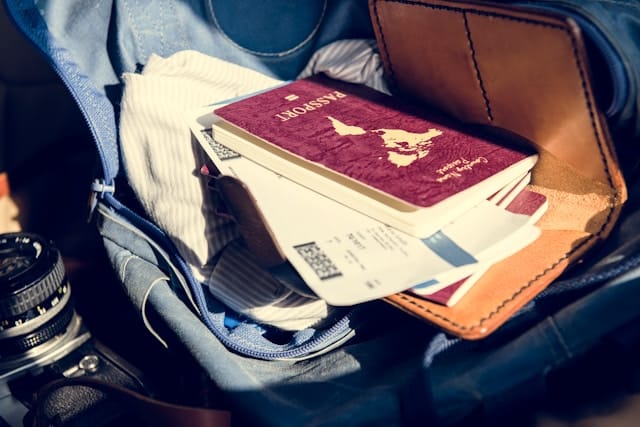Understanding visa types and requirements is essential to ensuring a smooth process when leaving the UK and going to another country.
Residents of the UK who are eager to travel or move to another country should research the visa options as they make their plans.
In some cases, employers need to know your plans before you make your move or you may have to need to wait several weeks to hear back about your application.
Visas for Traveling to France

If you’re interested in obtaining a French Visa, France offers different types of work visas depending on the length and nature of your stay, including:
- Short-Stay Visa: Allows non-EU/EEA/Swiss citizens to stay in France for up to 90 days. Employers must apply for a foreign employee work permit before the visa process begins.
- Long-Stay Visa: Required for non-EU/EEA/Swiss citizens staying in France for more than 90 days. Employers must secure a work permit before applicants submit their visa forms. Some long-stay visa holders will need to apply for a Carte de Séjour (residence permit) within two months of arrival.
- Intra-Company Transfer (ICT) Visa: Designed for employees transferring within multinational companies. This visa grants a one-year residence permit and is renewable.
- VLS-TS Visa: A long-stay visa equivalent to a residence permit, requiring registration with the Office Français de l’Immigration (OFII) within three months of arrival.
- Talent Passport: A special visa category for highly skilled professionals, researchers, and business investors. It allows stays of up to four years and is available to those making significant contributions to the French economy or workforce.
Visas for Traveling to Turkey

There are many different types of Turkish Visas depending on the purpose and duration of the visit.
- Tourist Visa: Allows visitors to explore Turkey’s culture and landmarks for up to 90 days within a 180-day period. UK citizens are eligible for an e-Visa, which can be obtained online within minutes.
- Business Visa: Designed for professionals attending meetings, conferences, or contract discussions. Like the tourist visa, it generally allows a 90-day stay but may require additional documentation, such as an invitation letter from a Turkish company.
- Student Visa: Required for individuals enrolled in a Turkish educational institution. Applicants must provide an acceptance letter, proof of financial support, and accommodation details.
- Work Visa: Necessary for foreign nationals seeking employment in Turkey. Employers must apply for a work permit on behalf of the applicant through the Turkish Ministry of Labor and Social Security.
- Residence Permit: For individuals planning to live in Turkey for more than 90 days. This permit can be renewed under certain conditions, and requirements vary based on the applicant’s circumstances.
Ensuring you apply for the correct visa type is crucial, as working on a tourist visa or engaging in tourism on a business visa can lead to penalties.
Visas for Traveling to the USA

The USA offers different types of visas based on the purpose of travel. You can get a USA Visa for any of the following reasons.
- ESTA (Visa Waiver Program): Allows UK citizens to visit the US for up to 90 days for tourism or business without applying for a full visa. Travelers must apply online before departure.
- B1/B2 Visitor Visa: For travelers visiting the US for business (B1) or tourism/medical treatment (B2). This visa typically allows stays of up to six months.
- Work Visas (H-1B, L-1, O-1, etc.): Issued to skilled workers, executives, or individuals with extraordinary abilities. Most require employer sponsorship and Department of Labor approval.
- Student Visa (F-1, M-1): Required for individuals enrolling in US academic or vocational programs. Applicants must provide proof of school admission and financial capability.
- Exchange Visitor Visa (J-1): For individuals participating in cultural exchange programs, including research, teaching, and professional training.
- Immigrant Visas (Green Card, EB-5, Family-Sponsored): For those seeking permanent residency in the US, often sponsored by an employer or family member.
Visas for Traveling to Australia

If you are interested in an Australian Visa, it’s important for you to understand that Australia provides different visas for various purposes, including:
- Tourist Visas for Short Stays: The Electronic Travel Authority (ETA) is available for citizens of specific countries, allowing multiple entries for up to three months within a year. Another option is the Visitor Visa, which applies to a broader range of nationalities and offers similar stay durations. Travelers should ensure they meet eligibility requirements before applying.
- Work and Holiday Visas: For travelers under 30 (or 35 for certain nationalities), the Work and Holiday Visa allows individuals to work and explore Australia for up to a year, with the possibility of extending to three years.
Applicants must meet specific requirements, including financial capability, age restrictions, and nationality criteria, as outlined by the Australian Department of Home Affairs.
Visas for Traveling to New Zealand

There are different New Zealand Visas for various travel purposes, and understanding the right one for will help you enter the country with ease.
- Visitor Visa: Designed for tourists and vacationers, this visa allows travelers to experience New Zealand’s stunning landscapes, from the Southern Alps to Milford Sound. It permits a stay for a set period based on individual eligibility.
- Work Visa: Required for those seeking employment in New Zealand. The country’s strong economy and job opportunities attract skilled workers from around the world. Applicants generally need a job offer from a New Zealand employer before applying.
- Student Visa: For individuals enrolling in educational institutions, New Zealand offers a student visa that grants access to its highly regarded universities and academic programs. Proof of enrollment, financial capability, and accommodation details are required for approval.
Additionally, New Zealand provides Transit Visas for those passing through the country and Working Holiday Visas for young travelers who wish to work and explore New Zealand simultaneously.
Visas for Traveling to Canada

Understanding the right Canadian Visa option ensures a smooth and legal stay in the country. Canada offers various visa types depending on the purpose and duration of travel.
- Tourist Visa: A type of temporary resident permit, the tourist visa allows visitors to explore Canada’s attractions. To be eligible, applicants must have a valid passport, proof of financial support, and strong ties to their home country to ensure they intend to return. Applications can be submitted online or at a visa application center. Biometric data, such as fingerprints and photographs, may be required, and some applicants may need to attend an interview at a Canadian visa office. Processing times vary, so applying early is recommended.
- Business Visa: Designed for those traveling for work-related purposes not covered by an Electronic Travel Authorization (eTA). This visa does not permit employment in Canada; individuals needing to work must obtain a separate work permit. Applicants must provide a letter of invitation from a Canadian company, explain their business activities, and demonstrate their ability to cover expenses. The duration of stay is determined based on the purpose and nature of the visit.
For those seeking long-term residence, permanent immigration pathways such as Express Entry and Provincial Nominee Programs are available, but they are separate from temporary business visas.
Visas for Traveling to India

India offers several visa types to accommodate different travel needs. Understanding the right Indian Visa option will help you prepare for your trip.
- Tourist Visa: This visa is for travelers looking to explore India’s rich culture, historical landmarks, and diverse landscapes. It is ideal for short vacations and sightseeing trips. The duration of stay depends on the visa category and applicant’s nationality.
- Business Visa: Designed for professionals attending business meetings, conferences, or trade events in India. This visa typically requires additional documentation, such as an invitation letter from an Indian company or organization.
- Medical Visa: Intended for individuals seeking medical treatment in India. Applicants need to provide medical documents, including a treatment plan from an Indian hospital.
- Conference Visa: For those attending official seminars, workshops, or conferences. A letter of invitation from the event organizers is required.
- Student Visa: For international students enrolling in recognized Indian educational institutions. Proof of admission and financial means to support studies are required for approval.
Each visa category has specific eligibility requirements and application steps.
Visas for Traveling to Egypt

There are a few types of Egyptian Visas available depending on the purpose and duration of your stay. Understanding the right visa type can help ensure a smoother immigration process.
- Tourist Visa: The most common visa type, it is meant for travelers visiting Egypt for sightseeing and leisure. This visa allows visitors to explore famous landmarks such as the Pyramids of Giza, Luxor temples, and the Red Sea beaches. Applicants must specify tourism as their reason for travel and provide a basic itinerary if required. Working or conducting business on a tourist visa is not allowed and can result in penalties.
- Work and Student Visas: For those planning to work or study in Egypt, a long-term visa is required. Student visas are issued to individuals accepted into Egyptian universities or educational institutions and require proof of admission and financial stability. Work permits are granted to individuals with employment offers from Egyptian companies. Employers typically assist in securing these permits, and applicants must comply with Egyptian labor laws.
- Transit Visa: Travelers passing through Egypt en route to another destination may need a transit visa. This visa allows a short stay, usually for a layover exceeding 24 hours. It permits travelers to leave the airport and explore the city before catching their connecting flight. Transit visa requirements vary by nationality and layover duration, so checking with an Egyptian embassy or consulate beforehand is advisable.
Visas for Traveling to Morocco

Morocco offers a straightforward process for travelers who need Moroccan Visas, depending on their nationality and length of stay.
- Visa-Free Entry: UK citizens can visit Morocco visa-free for up to 90 days for tourism and business purposes. Travelers must have a passport valid for at least six months beyond their date of entry and may be asked to show proof of onward travel.
- Tourist Visa: For stays exceeding 90 days, visitors must apply for a long-term visa from the nearest Moroccan embassy or consulate. Applicants may need to provide accommodation details, proof of financial means, and a return ticket.
- Work and Student Visas: Individuals planning to work or study in Morocco require a specific visa. Work visas are issued based on employer sponsorship, and student visas require proof of admission to a Moroccan institution. These visas often require additional documentation and processing time.
Visas for Traveling to Greece

As a member of the Schengen Zone, Greece follows standard Schengen visa regulations for travelers who need a Greecian Visa.
- Visa-Free Entry: UK citizens can visit Greece visa-free for up to 90 days within a 180-day period for tourism or business purposes. Travelers should ensure their passport is valid for at least three months beyond their intended departure date.
- Schengen Visa: Non-visa-exempt travelers must apply for a Schengen Visa, allowing short stays in Greece and other Schengen countries. Applications must be submitted through the Greek consulate or visa center, typically requiring proof of accommodation, travel insurance, and sufficient financial means.
- Long-Stay Visas: Those planning to stay in Greece for more than 90 days need a National Visa. Greece offers work visas for employment, student visas for university enrollment, and residence permits for retirees or individuals seeking long-term stays. The application process varies by visa type and may involve interviews or additional documentation.
Frequently Asked Questions About Visas
What is a visa, and why do I need one?
A visa is an official document that allows you to enter, stay, or work in a foreign country for a specific period. The requirements vary depending on the country, purpose of travel, and your nationality.
How do I apply for a visa?
Visa applications typically require completing an online or paper form, submitting necessary documents (such as a passport, financial proof, and travel itinerary), and attending an interview at the embassy or consulate.
How long does it take to get a visa approved?
Processing times vary by country and visa type. Some visas may be approved within a few days, while others can take several weeks or months.
Can I extend my visa if I need to stay longer?
Visa extensions depend on the country’s immigration policies. Some countries allow extensions, while others require you to leave and reapply for a new visa.
What is the difference between a single-entry and a multiple-entry visa?
- Single-entry visa – Allows you to enter the country only once.
- Multiple-entry visa – Permits multiple entries within a specified period.
Do I need travel insurance for my visa application?
Many countries require travel insurance as part of the visa application process, especially for Schengen visas and long-term stays.
What happens if my visa application is denied?
If your visa is denied, you can review the reason for rejection, correct any issues, and reapply. Some countries offer an appeal process for denied applications.
Can I work on a tourist visa?
No, working on a tourist visa is generally prohibited. You need a specific work visa or permit to engage in employment legally.
Where can I check visa requirements for my destination?
You can check visa requirements on the official embassy website of your destination country or use visa eligibility tools provided by government agencies.
